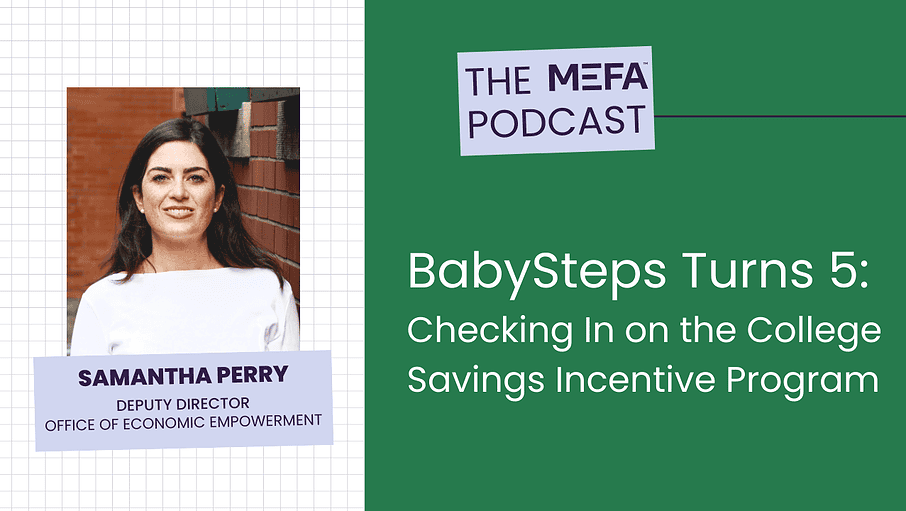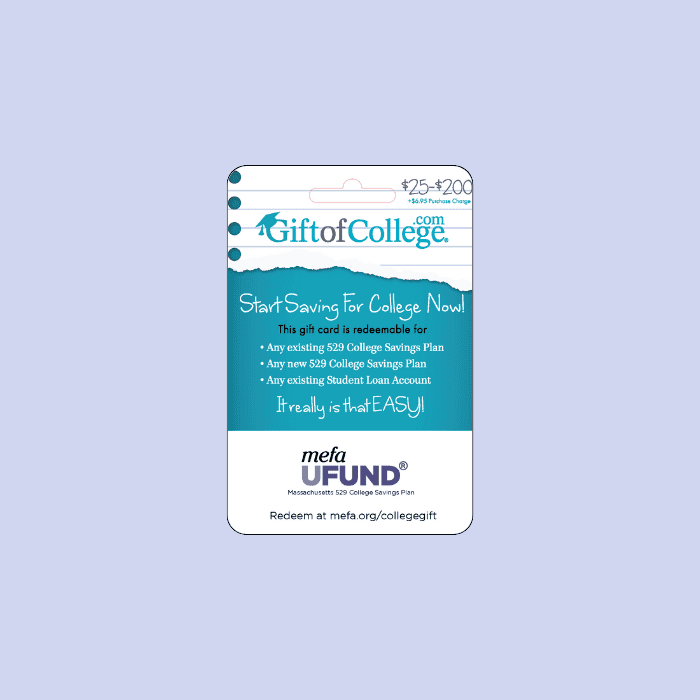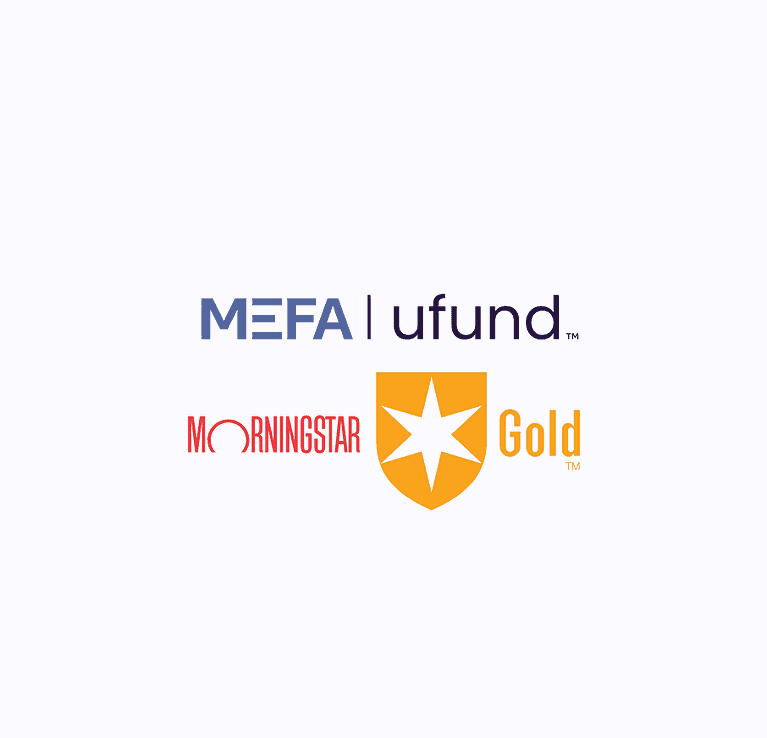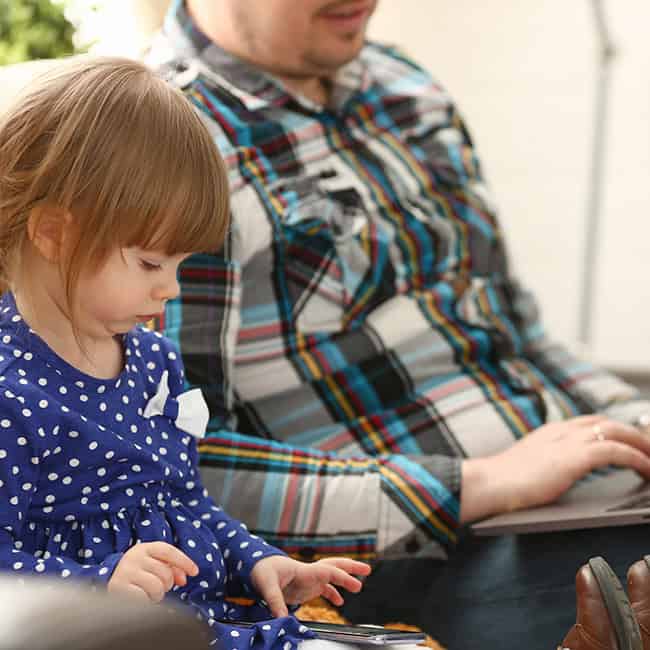Resources Mentioned in this Episode
Samantha Perry: [00:00:00] Why we started Baby Steps is there’s research and studies that show and indicate time over time that children have a higher likelihood of achieving their future higher education goals if they do have even a small amount of savings. There’s also links to improved maternal health, emotional health, when Families start these savings accounts early and often.
And so we we’re really inspired by that and inspired by a way to introduce families into not just saving, but investing.
Jonathan Hughes: Hello everyone and welcome to the MEFA Podcast. My name is Jonathan Hughes. [00:01:00]
Julie Shields-Rutyna: And I’m Julie Shields-Rutyna.
Jonathan Hughes: Hi Julie.
Julie Shields-Rutyna: Hi Jonathan.
Jonathan Hughes: How you doing?
Julie Shields-Rutyna: Great.
Jonathan Hughes: And you just heard from our guest on the show today, Samantha Perry. She’s the Deputy Director of the Massachusetts State Treasury’s Office of Economic Empowerment.
She’s a very good friend of ours, a new mom, and she’s here to talk to us about the Baby Steps Savings Plan, which is celebrating its fifth birthday this year. So if you or someone you know reside in Massachusetts and are expecting a baby, or adopting a child, or have a new baby, Or adopt a child in your life, you’re likely eligible to receive 50 in a U Fund account through the Baby Step Savings Plan before that child’s first birthday or date of adoption.
So Samantha is going to tell you all about how to do that. She’s going to talk about how she did that herself as a new mom. And also, five years into this experiment, the Baby Steps plan. [00:02:00] We’re going to talk about how our efforts have paid off, what we’ve learned, and where we are going. But before we get to that, Julie, I think we should have a mailbag question. What do you think?
Julie Shields-Rutyna: I agree, Jonathan. Yes.
Jonathan Hughes: Okay remember folks, questions from the mailbag are actual questions that have come into us over the past weeks and answered by our college planning team, so if you have any questions, please remember you can reach out to us over email at collegeplanning@mefa. org, over the phone at 800 449 MEFA, and over social media, of course, on Facebook, we’re at M I’m sorry, on Facebook, we’re at @MEFAMA, on X, it’s at @MEFATweets, and on Instagram, it’s @MEFA_MA. Now, today’s question is, of course, a 529 question, and it comes to us from a customer who writes, Does the MEFA UFund currently allow rolling over unused balances to a Roth IRA for the [00:03:00] beneficiary, as is now allowed? And if not, are there any plans or considerations to add that in the future? Julie, what is this person talking about? And then answer the question.
Julie Shields-Rutyna: Yes. The short answer is yes. Yes. It, this is able to be done with the U Fund in Massachusetts, but let me just go back and give a little bit of information about what she’s asking.
As we know with a 529 plan in order to fully take. Advantage of all of the tax benefits. The money when you take it out has to be used on qualified educational expenses. That’s the sort of the tax term. And we know some of those expenses are tuition and fees and room and board and books and supplies and then it’s even expanded to.
Be some K through 12 expenses and paying off some of your student loans and apprenticeships and the newest qualified educational expense is that you can roll [00:04:00] over some of it to an IRA if you don’t use it all on those other qualified educational expenses. And so that’s great. There’s an expanded use.
I think that might give a lot of families peace of mind. With that question we’ve always gotten, what if I don’t use it all? There are continued ways to, to use that. But there are a number of qualifications to that. It’s not just as easy as, sure, roll it over to an IRA. So some of those qualifications are that the money has to have been in the account for this beneficiary, for the beneficiary that you want to roll it into their IRA for 15 years.
And any monies in, in that account have to have been. In the account five years prior. So you can’t roll over anything within a five year period. And then there’s an overall limit. So overall you can [00:05:00] only roll over 35, 000. So that’s another limit. And you have to do that on on an annual basis where you can roll, depending on your age under 50 or over 50 under 50, you can roll 7, 000 a year in.
Over 50, you can roll 8. Yes, this is great. This is another way that a family can use this money if they haven’t used it on the other qualified educational expenses. But, make sure you understand all of those qualifications. And, I’ll just add one piece about how do you do this. You would just go to your 529 provider.
In this case, the U Fund Fidelity. Fill out the paperwork, then you withdraw the funds, and then just once you withdraw within 60 days, make sure you just get them into an IRA of that same beneficiary.
Jonathan Hughes: Alright, thanks Julie! So remember, once again, reach out to us with any questions at collegeplanningatMEFA.[00:06:00]
org, by a phone at 800 449 MEFA, Facebook @MEFAMA, X at @MEFATweets, and Instagram @MEFA_MA. We have a bench of college guidance experts ready to listen. We’ll be back at the end to wrap it up, but now let’s hear from our guest. On the show and talk Baby Steps.
Samantha Perry: Okay, that sounds great. Great to see you Jonathan.
My name is Samantha Perry I’m the Deputy Director at the Office of Economic Empowerment. We are a Department of the State Treasurer’s Office here in Massachusetts.
Jonathan Hughes: Before I ask you what specifically brings you here today we’ve had a few folks from oee on before but if you can take just a second and talk about oee and what they do generally What’s special about this year for OEE? And then we can move into where we intersect.
Samantha Perry: Yes, that sounds great. I’ve been with the Office of Economic Empowerment since 2017 and we are celebrating our 10 year anniversary in the office this year. So I’d love to talk a little bit about the history of the office. [00:07:00] We so financial education has historically a lot of state treasurers have done programming on financial education.
But when Treasurer Goldberg took office in 2015, she really saw an opportunity as well as a really a responsibility as the CFO of the state to to to increase access to educational opportunities and really understanding about everything from savings vehicles like the U Fund to how to file your taxes and really take a bird’s eye view of what the landscape was and on.
Economic Empowerment and Financial Education here in the state. So just a quick background she started our office, the Office of Economic Empowerment, and she appointed Elena Van Tassel as the Deputy Treasurer and Executive Director of the office, and right away she actually called for a task force to come together and identify what the areas of opportunity were really in the state for our office to address.
She gave this task force six [00:08:00] months. They came back with a report, the financial literacy task force report and that report had 22 recommendations and it really served as a blueprint for the work that our office did. One of those recommendations was to do some work in the saving space for higher education for families in Massachusetts.
And this was back in 2015, so we were pretty fresh off of the The financial crisis that affected so many families in Massachusetts in 2008 2009 and so that really is, one of the driving forces I graduated in 2010 and it definitely was a big impact and big conversation that happened amongst me and my friends.
And I think that’s something that the subprime mortgage crisis and a lot of these. Things that really impacted people’s economic stability in our state. The treasurer really saw and heard that. And this our office’s response to that.
Jonathan Hughes: I’m glad that you were actually able to situate that [00:09:00] historically in the aftermath of the economic crisis.
Cause I think that’s. That’s really important context. And I don’t think we’ve had that mentioned before. I know one of the most important things, the first thing that she did the treasure was to create the OEE, and baby steps, right? So if you could explain baby steps and what’s significant about that. What’s going on now with Baby Steps?
Samantha Perry: Yeah, so Baby Steps is a partnership that we have with MEFA where we the state treasurer’s office gives families in Massachusetts 50 to start their youth fund account and we pair that with opportunities and access to financial education and the goal of this initiative is really to encourage Individuals who otherwise might not feel comfortable saving in a vehicle like a U Fund to know about it, to learn about it, and to increase the amount of Massachusetts residents that are starting to save early and often for their children’s [00:10:00] future financial and career training expenses.
So this year is really exciting because we are celebrating five years of Baby Steps. So our baby Jonathan is going to kindergarten, oh which is really exciting. We started the initiative with pilot programs SEDMA and SORMA and the cities of Worcester and Springfield, Lowell, let’s see if I can name them all, Pittsfield,
Jonathan Hughes: Oh, this is Seed?
Samantha Perry: Way back, yeah, Seed/Soar. We started with the pilot program and now we’re in this we launched Baby Steps as a response to the pilot program. And we really wouldn’t have been able to do it without the support of all the partners and cities and towns that helped us.
Jonathan Hughes: Yeah, I know. I remember those days.
Those were fun days. I don’t know if you were part were you part of those SEED programs? You were, right?
Samantha Perry: I was, yeah. It was really all hands on deck with SEED and SOAR. I definitely made some trips out to Worcester and got to speak with some families and we all knew how learned how to enroll families, which was really beneficial and helped us [00:11:00] think about the different opportunities that we had when launching Baby Steps.
Jonathan Hughes: Yeah, for sure. And it’s funny, you mentioned earlier The Office of OEE was created in the shadow of the financial crisis and baby steps was launched five years ago, right? As The COVID pandemic was starting, right?
Samantha Perry: Exactly. Exactly. Which we never could have predicted. Especially we really had a strong partnership with hospitals leading up to the launch of baby steps.
And so we had a whole plan and unfortunately we had to shift. And I think many families across. The state had to shift their plans as well.
Jonathan Hughes: Tell me about the big picture of Baby Steps. What goals does it have? And how are we measuring the success of that and the growth of the program?
Samantha Perry: Yeah, that’s a great question. So MEFA does a phenomenal job spreading the word about the youth fund to Massachusetts families and really different There are, different points and stages of their [00:12:00] savings journey or their planning for their child’s future educational costs. Why we started Baby Steps is there’s research and studies that show and indicate time over time that children have a a higher likelihood of achieving their future higher education goals if they do have even a small amount of savings.
There’s also links to improved maternal health emotional health when families start these savings accounts early and often. And so we we’re really inspired by that and inspired by a way to introduce families into not just saving, but investing. And so it, we know in the financial education space that there are key points in someone’s life that really are there. There’s big change is happening and it’s a good time to introduce behavior change. And when a family is introducing a new baby into their [00:13:00] life, or whether they’re adopting or having a child that is a really key time that someone, a family is looking at their finances and looking about what their future is.
And so we want to really Think about that and think about introducing these types of behaviors and in that saving for higher education and showing that even a little bit really makes a big difference over time.
Jonathan Hughes: Yeah. And so that’s we’re going to talk about that more personally in just a minute. But that is a long term work, right?
You’re talking about behavior change and whatnot. And what are we seeing? There were certain right. Assumptions that we had going in. We knew who was going to take advantage of the program, but we had target populations that we were trying to reach. How are we doing that? And maybe what is our success there?
And what are some of the challenges that we have? Yeah, that’s a great
Samantha Perry: question. Yeah when we think about this program it’s available to anyone regardless of what your income [00:14:00] is. And we know that higher income families often save in five, five to nine accounts and you find accounts.
So while it’s available to everyone, we really have looked at communities in Massachusetts that have a higher percentage of babies being born with a lower income in those communities. And we’ve really invested a lot of research or communications and work into making sure that those families are aware that this program exists and what that really looks like.
And something that we’ve launched in the last couple of years is a partnership with SNAP. We have included, increased The deposit amount from 50 to an additional 10 a month for families receiving SNAP benefits in Massachusetts. So that amounts to, in that first year of saving, 170 as a jump start to their future career training, higher education expenses, which is really remarkable and exciting.
And we’ve seen, some [00:15:00] really interesting shifts. So some of our research indicates that. From 2021 to 2023, neighborhoods, low-income neighborhoods in Massachusetts saw an 11 percent increase in account openings and middle income neighborhoods saw an 8. 5 percent increase in account openings.
While it’s incremental, it’s something. We’re seeing that change happening. And then we look at how families are saving, too, and while we see about 90 percent of accounts have had at least one additional deposit besides the 50 deposit from us which is really promising. We, we’re seeing more and more automatic deposits, and from those automatic deposits, about six, over 60 percent of them, they’re less than 100 a month and so that’s really promising.
And we know that people are saving even just a little bit each month to start their children on. Their journey for whatever their future might hold. So that’s really promising. And I’d be glad to talk a little bit about our Community Ambassadors initiative as well. So that’s something we rolled [00:16:00] out in the last couple of years.
And the reasoning behind Community Ambassadors is really to have people Who are part of the community leaders in the community respected, know about our program and be able to be spokespeople to individuals who might qualify for Baby Steps. So what Community Ambassadors is we have a essentially like a Paid volunteer program for we have between eight and ten ambassadors each year in those communities that we have identified as having a high birth population and typically lower income.
And there’s a public advertise, a public interview process. People apply to be ambassadors each year. They go through an a process. They’re selected, they go through training. And then we give them, we turn them over with a toolkit of everything they need to spread the word about Baby Steps, as well as our financial education programming.
And that’s really where that’s hand in hand. So once they become ambassadors with us, they get this toolkit and they, They spread the word to [00:17:00] everywhere from daycares to houses of worship, supermarkets, barbershops, you name it. Where people are, we, in those communities, we want information about Baby Steps.
And then we take it a step further that we have, they run financial education workshops. They partner with local banks education centers. on delivering financial education. They present to different organizations on Baby Steps and other initiatives. They post in parent groups on Facebook. They partner with pediatricians offices.
You name it, there’s an entire outreach plan for ambassadors. And while OEE, our staff would love to be everywhere, we love being in the community, there’s only so many of us and we have other initiatives as well, so it really helps it helps us drive the, that mission and the message as far as possible.
But I think it’s even more impactful to have people and trust sharing that information. People are a lot more likely to open up an account if they’re hearing it from someone they recognize who understands their community. And it really is a huge, [00:18:00] is a tremendous benefit to our office as well because we end, we, this is a finite program.
that we do each year at the end of the community ambassador cohort. We invite everyone into Boston for lunch. They meet with the treasurer Goldberg and she and our staff get to hear exactly their feedback on our initiatives and how our outreaches and that really enriches our programs.
That it’s not just something that’s developed, from government staff that is, this is being driven not only by research, but by. What the people are looking for and what their responses are to saving and what their challenges are too.
Jonathan Hughes: I will say that one of my favorite things is that I do get to be involved in some of that effort and everybody at OEE does just.
An amazing job with the outreach and setting up enrollment hubs and training community ambassadors and finding out, who those partners are in the community and training them. And it’s really I just I’m really impressed in all of the [00:19:00] work that you all do over there and glad to be a part of it.
Now I mentioned earlier that we’re going to be speaking for personally about something you mentioned earlier, and that is you are. A Baby Steps customer yourself, right? You are a new mom.
Samantha Perry: Yes, so we just celebrated our daughter’s first birthday last week. So Francis was born last January. There is a rainbow on the day she was born.
We think good sign I’m giving this interview in downtown Boston right now, right down the street at MGH shout out to Dr. Pocious and her team at MGH. They’re fantastic over there, but yeah, so we’re a Baby Steps family now, so happy to talk a little bit about our experience.
Jonathan Hughes: Please do.
Samantha Perry: So it was interesting, it was really surreal, because as Jonathan, I’ve been part of this program since the beginning, and you think you’ve thought about every single obstacle or question someone might come up with, but until you really experience it yourself it’s a totally different ballgame, and it, [00:20:00] we first heard about it.
baby steps from our or first encountered it was during a doctor’s appointment visit at MGH, probably in my third trimester. So it was towards the end right before we were about to deliver, they give us, give all expecting parents a packet that has a lot of different information in it.
And in it is a live birth registrant form. On that form on the second page, there was information about Baby Steps and so I was able to take a look at that information, which was a little bit surreal because I helped to write it back in the day and, we’re now, here we are five years later and I was looking at it and from that perspective and then when I was in after we welcomed Francis to the world and we were getting ready to go home, the birth registrar from the hospital actually came in and visited us and she walked through some of the questions and made sure that we filled everything out correctly.
And I think I was probably the first parent to ever say, okay, grab your photo because you’re famous in our [00:21:00] world because you’re you register the. the families and get to tell them about Baby Steps, so she was really delighted to share that she always tells families to check the box, and that’s really the first encounter that families have with Baby Steps typically, is they’ll get some information, there’s a little bit of information on that form that says the state charter’s office partners with MEFA, can they contact you to tell you about an initiative to start saving, with the Starting with a 50 deposit from the state into a U Fund.
And once someone checks that box that’s giving permission for MEFA to contact them and give them information about Baby Steps. And it’s really powerful. So I went through that process, we checked the box and then a couple of months later I expected to do it the minute I got home, but honestly, Things get busy when you have a newborn.
So a couple months later, my husband and I sat down and we went through the process of actually opening up the youth fund. And that was also really helpful because I was able to see the type of questions that my husband came up with. So I really let him [00:22:00] do most of the work and then I sat next to him and was able to answer some of the questions or maybe not answer some of those questions. And, then when the account was we fulfilled it. We received the deposit a couple of weeks later, and and we get regular statements and updates on it, which is really helpful.
Jonathan Hughes: And so you let your husband set up the account to see what he ran into? Is that right?
Samantha Perry: Yeah, exactly.
Jonathan Hughes: And how smooth was that process for him? Did you have to get any assistance from any sources like Fidelity or not?
Samantha Perry: So we didn’t have to reach out to Fidelity at all, but there were some questions that I think, I think everyone gets tripped up on the investment options. And that’s where and that’s really why we’re doing this program.
I think that there are some questions that, That could, that might be a stop sign for someone to turn around, and we want to make sure that people stop there and pause and think about what that question is around the investment options, are able to get the information and resources they need, and then move [00:23:00] forward into their next step in their journey.
So that’s exactly where we had to pause because I said, I do know this, but maybe we should think about it more because it’s a big question, and so we had to do a little bit more research, and and he really wanted to do that research as well, and then, and
Jonathan Hughes: So and then a few weeks after that the seed money, the 50 gets put in and after that, now I’m asking you this in part because I just spoke to a grandparent who was contributing to his granddaughter’s 529 accounts.
Did you get the word out to family and friends about how they can actually contribute? One of the things that we’d like to. Hammer home is that you’re a parent you’re saving for your child. You don’t have to take everything on Your shoulders completely other people can help out. Did you do that? And how folks do that?
Samantha Perry: Yeah That’s a great question. And I will say this is always a little bit of a hard conversation, I think, for people to have and I’m the first [00:24:00] person in my family to go to college, and I think that really impacts how, I will say that I think my family has definitely had the hesitations that we hear from parents all the time of, okay, but if we save this, is that going to impact Frances chance at scholarships later, or her financial aid, or what if she doesn’t use it?
And all of those questions, I think, come up quite frequently. And is this as safe a vehicle as saving in a regular savings account? So I think that those are the opening up the account really allowed us to have those types of conversations and we referred some of our family members. to the MEFA website has a really easy to use calculator that can show how savings can grow over time.
It’s an estimate, but it’s, I think, really helpful to use. I also was really excited in the fall when MEFA launched the gift card that makes it really easy for families to contribute that way and that, that’s a nice way for us to to grow the account as well. I was so excited about the gift card.
We actually, we [00:25:00] wrote a letter to the editor that was picked up from a couple newspapers about how as much as we appreciate toys, gifts, anything, and we are so grateful for all of the generosity from our family helping us save for Francis’s future, and that it really is a community effort.
I think that that is a message that we really can’t. We wanted to share with her grandparents and other family members and friends.
Jonathan Hughes: So if you could say one thing to parents who maybe have checked the box or heard a little bit about this and they’re not sure if they should do this or not what would you say to them?
Samantha Perry: Oh, that’s a great question. I’m saying and I think I do come up with it come up with this all the time because when you’re a new parent, you magically meet other people strolling and whether it’s at the farmer’s markets or, at a yoga class or story time. And it’s and I often ask people, I have you heard about this?
This program. We want to make sure that you don’t leave the 50 on the table, and I think I would say that it’s a investment of small [00:26:00] investment of time that can lead to a big investment in your child’s future. So even a little bit counts. Do not be intimidated. I think that it’s it’s really doesn’t take too long to open the account and you can open it and think about how you’re going to utilize it and save over time, but the sooner you start investing, the better.
Jonathan Hughes: Is there anything that I haven’t asked about that you’d like to address?
Samantha Perry: Yeah, just a couple of things I wanted to say. So in we’re celebrating our five year anniversary at OEE and we’re or I’m sorry, our five year Baby Steps anniversary and our 10 year OEE anniversary. So we’re giving our marketing a little bit of a facelift.
And I also want to say a tremendous thank you to all of the partners that make this program possible. There are countless organizations, individuals across the state that have been Phenomenal. Just listening to our presentations, spreading the word to their families [00:27:00] and really taking this initiative and our passion for it and spreading the word in their communities.
And we would not be able to do this work without them. And In a special thank you to MEFA and the partnership that MEFA has given us over the last several years it is so much fun working with the MEFA team they’re always coming up with new creative strategies to reach families and I, we’ve really seen just in the, especially in the last year How they’ve evolved the way that they’re communicating with families, and it’s just so impactful it’s responsive to the feedback that we’ve heard from communities.
So just a huge thank you for the work, and a congratulations to all of you for helping us make five years, because we couldn’t do it without you.
Jonathan Hughes: No, thank you so much. It’s, as I said, it’s a pleasure to work with all of you at OEE on Baby Steps, and it was a pleasure to have you on the show!
Samantha Perry: Thank you! Thank you so much.[00:28:00]
Jonathan Hughes: All right, everyone. That was our show. Once again, I want to thank Samantha Perry for being here and sharing her time and her experience with us. And I’d like to thank Julie for joining us.
Julie Shields-Rutyna: You’re welcome.
Jonathan Hughes: And if you’re listening and you liked what you heard and you want to hear more from us on planning, saving and paying for college and career readiness, then follow the show wherever you get your podcasts.
And please remember to rate and review us. It just helps us to keep doing what we are doing. Thanks to Shaun Connolly, our producer. Lisa Rooney, Lauren Danz, Meredith Clement, and AJ Yee for their assistance in getting the show posted.
Once again, my name is Jonathan Hughes, and this has been the MEFA Podcast.
Thank you.













